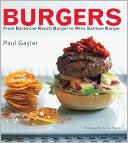Hamburger: A Global History
McDonald’s founder Ray Kroc once said, “It requires a certain kind of mind to see beauty in a hamburger bun.” The hamburger has been a staple of American culture for the last century, both a source of gluttonous joy and a recurrent obstacle to healthy eating. Now the full beauty of the burger in all its forms is explored in Hamburger, a debut title in Reaktion Books’ new Edible series.\ Andrew F. Smith traces the trajectory of hamburger history, from its humble beginnings as a...
Search in google:
McDonald’s founder Ray Kroc once said, “It requires a certain kind of mind to see beauty in a hamburger bun.” The hamburger has been a staple of American culture for the last century, both a source of gluttonous joy and a recurrent obstacle to healthy eating. Now the full beauty of the burger in all its forms is explored in Hamburger, a debut title in Reaktion Books’ new Edible series.Andrew F. Smith traces the trajectory of hamburger history, from its humble beginnings as a nineteenth-century street food sold by American vendors, from which it soon spread to the menus of diners and restaurants. The sandwich came into its own with the 1921 opening of the first hamburger chain, White Castle, and subsequent successful food chains such as McDonald’s and Wendy’s ensured the burger’s success in the United States and around the world. The hamburger irrevocably changed American life, Smith argues, as the sandwich propelled the rise of fast food over home-cooked meals in Americans’ eating habits. At the same time, burgers were making inroads in American culture, as well as becoming a rich symbol in paintings, television, and movies. Smith also discusses the darker nutritional, economic, and cultural conflicts raised by the hamburger, such as the “McDonaldization” of international cultures.A juicy and richly illustrated read, Hamburger will stimulate the taste buds of carnivores the world over. The Chronicle Review "In slim formats--a lot more than a soupcon, far less than a magnum--each Edible title will spotlight a food or drink in global context. The primary intent, says the series editor, Andrew F. Smith, is to reach the 'thinking public' with matieral drawn and translated from scholarly work. . . . Smith says he looks at food writing 'as a tool to talk about other things.' For his own Edible book, Hamburger: A Global History, a central 'other thing' is globalization, even as he starts very locally."--Nina C. Ayoub, The Chronicle Review
Introduction 71 Humble Hamburger Beginnings 112 The Hamburger Chain 253 The McDonald's Machine 424 McDonald Clones 645 The Hamburger Experience 766 The Global Burger 877 Hamburgers Today and Tomorrow 111Recipes 125Select Bibliography 138Websites and Associations 140Photo Acknowledgements 144Index 145
\ Atlantic“A timely retort to gourmandism run amok, the first three titles in this chapbook series aim . . . to illuminate and elevate taken-for-granted staples via concise, discrete histories. As such, Hamburger is equal parts myth debunker and modernization theorizer.”—Atlantic\ \ \ \ \ \ Booklist"No other American food, not even the hot dog, dares lay equal claim to the hamburger's iconic status. Food historian and sociologist Smith traces the origins of the hamburger to its murky nineteenth-century birth, refusing to credit any of the competing claims to the ground-beef sandwich's beginning, nothing the absence of any primary documentation."\ \ \ \ Chicago Tribune“The books in the Edible series combine straightforward historical data with affectionate ruminations on how the food shows up in culture: movies, music, TV shows, billboards, slogans.”—Julia Keller, Chicago Tribune\ \ \ \ \ \ Eats.com"Smith knows his hamburger history . . . and his synopses of the rise of the great burger chains, and their global impact, provide an interesting point of view on the effects of globalization in the modern world."\ \ \ \ \ \ Gastronomica"The remarkable feature of Hamburger is that it evinces genuine wonder at the innovation behind fast-food chains. It can be easy to deplore the rise of fast food or take it as a foregone conclusion, but Smith makes a point of celebrating ingenuity and letting the reader enjoy it, as well."--Gastronomica\ — Margot Kaminski\ \ \ \ \ \ The Chronicle Review"In slim formats--a lot more than a soupcon, far less than a magnum--each Edible title will spotlight a food or drink in global context. The primary intent, says the series editor, Andrew F. Smith, is to reach the 'thinking public' with matieral drawn and translated from scholarly work. . . . Smith says he looks at food writing 'as a tool to talk about other things.' For his own Edible book, Hamburger: A Global History, a central 'other thing' is globalization, even as he starts very locally."--Nina C. Ayoub, The Chronicle Review\ \ \ \ \ \ Ken Hom"The Edible series contains some of the most delicious nuggets of food and drink history ever. Every volume is such a fascinating and succinct read that I had to devour each in just a single sitting. . . . food writing at its best!"\ \ \ \ \ \ Robert Sietsema"Books in Reaktion's Edible series are paragons of their type; concise and flavorful, jammed with interesting facts, period photos and just a handful of recipes, in case you want to 'do it yourself.' I recommend these books to foodies and academics alike."\ \ \ \ \ \ Chicago Tribune“These are food memoirs, salacious and exotic, colorful, powdered, sweet, greasy and globe-trotting.”\ \ \ \ \ \ The Chronicle Review"In slim formats--a lot more than a soupcon, far less than a magnum--each Edible title will spotlight a food or drink in global context. The primary intent, says the series editor, Andrew F. Smith, is to reach the 'thinking public' with matieral drawn and translated from scholarly work. . . . Smith says he looks at food writing 'as a tool to talk about other things.' For his own Edible book, Hamburger: A Global History, a central 'other thing' is globalization, even as he starts very locally."\ \ \ \ \ \ Gastronomica"The remarkable feature of Hamburger is that it evinces genuine wonder at the innovation behind fast-food chains. It can be easy to deplore the rise of fast food or take it as a foregone conclusion, but Smith makes a point of celebrating ingenuity and letting the reader enjoy it, as well."\ \ \ \ \ \ Chicago Tribune“These are food memoirs, salacious and exotic, colorful, powdered, sweet, greasy and globe-trotting.”—Christopher Borrelli, Chicago Tribune\ — Christopher Borrelli\ \ \ \ \ \ Atlantic“A timely retort to gourmandism run amok, the first three titles in this chapbook series aim . . . to illuminate and elevate taken-for-granted staples via concise, discrete histories. As such, Hamburger is equal parts myth debunker and modernization theorizer.”—Atlantic\ \ \ \ \ \ Booklist"No other American food, not even the hot dog, dares lay equal claim to the hamburger's iconic status. Food historian and sociologist Smith traces the origins of the hamburger to its murky nineteenth-century birth, refusing to credit any of the competing claims to the ground-beef sandwich's beginning, nothing the absence of any primary documentation."--Booklist\ \ \ \ \ \ Eats.com"Smith knows his hamburger history . . . and his synopses of the rise of the great burger chains, and their global impact, provide an interesting point of view on the effects of globalization in the modern world."--Eats.com\ \ \








